Climate Justice, Climate Finance and Pragmatism for Tropical Jurisdictions at COP28
Exploring the urgency of subnational climate action: insights from COP28 on financing tropical forest conservation, indigenous empowerment, and sustainable livelihoods by the Governors’ Climate and Forests Task Force network.
The Governors’ Climate and Forests Task Force (GCF Task Force) engaged in the 28th Conference of the Parties (COP28) to the United Nations Framework Convention on Climate Change (UNFCCC) held in Dubai, marking a pivotal moment in the global climate dialogue. This significant international forum serves as a crucial platform where nations, subnational entities, and civil society collaborate to address climate change challenges. During the conference weeks in Dubai (December 2 – 13, 2023), the GCF Task Force actively participated in high-level discussions, bilateral partnerships, and celebratory events.
At COP28, our mission remained steadfast — underscoring the urgent need for subnational climate action and showcasing its transformative power. Panel discussions centered around implementing innovative financing mechanisms, leveraging carbon markets for Indigenous empowerment, and executing jurisdiction-scale programs to combat deforestation while supporting sustainable livelihoods. We are proud to have contributed to the global efforts to combat climate change and advance impactful solutions during this important conference. Looking ahead, our focus remains on fostering and strengthening partnerships, bringing together governors, mobilizing financial resources, facilitating meetings and amplifying the voices of Indigenous Peoples, local communities, and the exceptional women leaders for forests and climate townhall.
The GCF Task Force is a network of 43 subnational governments – states, provinces, regions, and departments from 11 countries covering a third of the world’s tropical forests. We are a project of the Emmett Institute on Climate Change and the Environment at UCLA School of Law and UCLA’s Institute of the Environment and Sustainability, in partnership with the Institute of Behavioral Science at the University of Colorado, Boulder.
Mobilizing finance to tropical jurisdictions
State and regional representatives from the Governors’ Climate and Forests Task Force (GCF Task Force) have formally urged the international community to endorse tropical forest conservation and sustainable economic development in their regions. The plea was announced in two rounds with the representation of several of our member Governors in Dubai’s ExpoCity 2020, where COP was taking place. On December 5, GCF Task Force Governors from Brazil and Mexico, and subsequently Governors from Peru and Ecuador on December 8, launched an important “Call to Action – Financing the New Forest Economy.” This call to action solicits partnerships from the donor community, the private sector, and civil society to get funding flowing—in a quick and agile manner—to the states and provinces of the GCF Task Force that are on the frontlines of the climate change battle to support their climate mitigation and adaptation efforts. This funding would take advantage of existing mechanisms, when possible, and would also align with the Manaus Action Plan of the GCF Task Force. It would also support the states’ investment plans and immediate funding needs, as outlined in a new report released at COP28 entitled “Building the New Forest Economy: Advancing Climate Action through the Governors’ Climate and Forests Task Force.”
Launch 2 on December 8th:
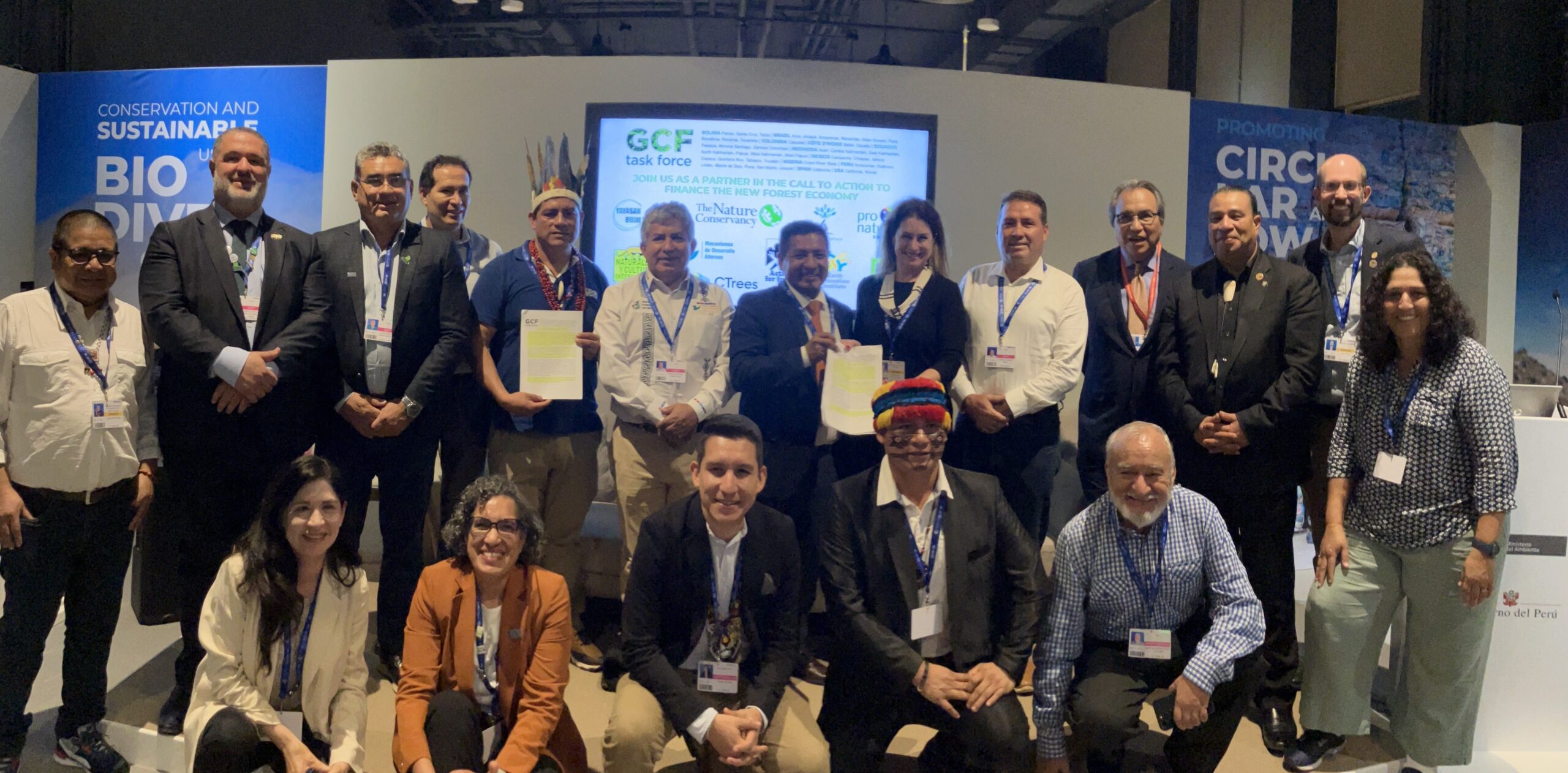
The GCF Task Force call-to-action echoes other important movements as the Brazilian “Tropical Forests Forever”, the eminent approval of the massive Territorio Indígena Originario Campesino project in Bolivia covering an expansive 3.5 million hectares, the term-sheet signing between the State of Acre in Brazil and Emergent for a emissions reduction payment agreement (ERPA), and Indonesian province of West Kalimantan agreement with our homonymous organization the Green Climate Fund (GCF), with support from the German development bank (GiZ). All these events make evident the continuous effort to steer financial resources to the Global South. It also increases the pressure on delivering the necessary commitment made in 2009 for USD 100 billion per year for climate finance directed to the Global South, a goal that was never met and is considered one of the major obstacles on achieving climate results.
Leveraging the voice of indigenous peoples, local communities, and women from tropical jurisdictions
Recent developments of the GCF Task Force include important steps into formalizing the participation of our partners from Local Communities, Indigenous People and a gender policy to our global work. We support our member jurisdictions with training and a series of principles for subnational governments to engage with IPLC globally, and count with a Global IPLC Committee formed by Indigenous leaders and associations, as well as provide guidance and advocate for jurisdictions to incorporate a gender perspective in our work.
The GCF Global Secretariat facilitates important meetings throughout the year, and at COP28 we have had the privilege to host our Global IPLC Committee meeting, with Francisca Arara (Acre, Brazil), Javier Kinney (Yurok, USA), Nedina Xiu Yawanawa (Acre, Brazil), Prof Charlie Heatubun (West Papua, Indonesia), Prof. Gusti Machmud (West Kalimantan, Indonesia), Prof. James Anaya (Former Dean of Colorado University and Former UN Special Rapporteur on the indigenous peoples rights), together with the GCFTF country coordinators and project directors, where recent developments in the agenda have been discussed. You can check more information about the meeting in this blog post.
Another milestone achieved during COP 28 was the meaningful Women for Forests and Climate Town Hall that counted with the vibrant participation of Francisca Arara (Secretary of Indigenous People for Acre, Brazil), Christina Snider-Ashtari (Tribal Advisor for Governonr Newsom of California), Huguette Hernandez Gomez (Secretary of Environment, Quintana Roo, Mexico), Nedina Xiu Yawanawa (Acre, Brazil), and distinguished participants from across the world, moderated by GCFTF Co-director Colleen Scanlan Lyons. The conversation was held in a welcoming environment, where personal experiences pulled the string for practical and applicable tips from each participant’s own trajectory. Make sure to check the highlights and recording.
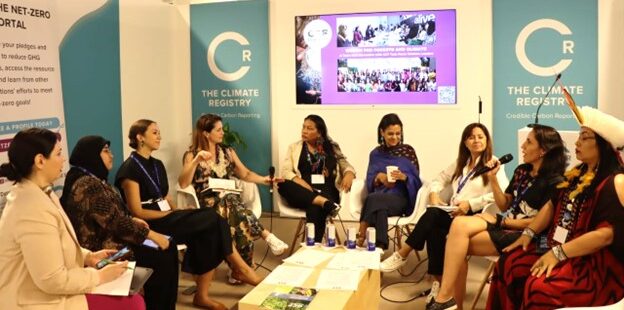
Strengthening connections within and beyond the GCF Task Force member jurisdictions
The GCF Task Force participation included an official side event (see video recording) where audience members learned about the current advancements in financing jurisdictional approaches to climate action and forest conservation, with panels on forest governance, bioeconomy and market connectivity, and results-based payments with participants ranging from civil society organizations like Grupo Aje from Peru, and the Sustainable Amazon Foundation (FAS, in the Portuguese acronym), to the Governors of several of our member jurisdictions. This diverse roster illustrates the need for an integrated landscape approach to successfully implement actions that work for forests and people.
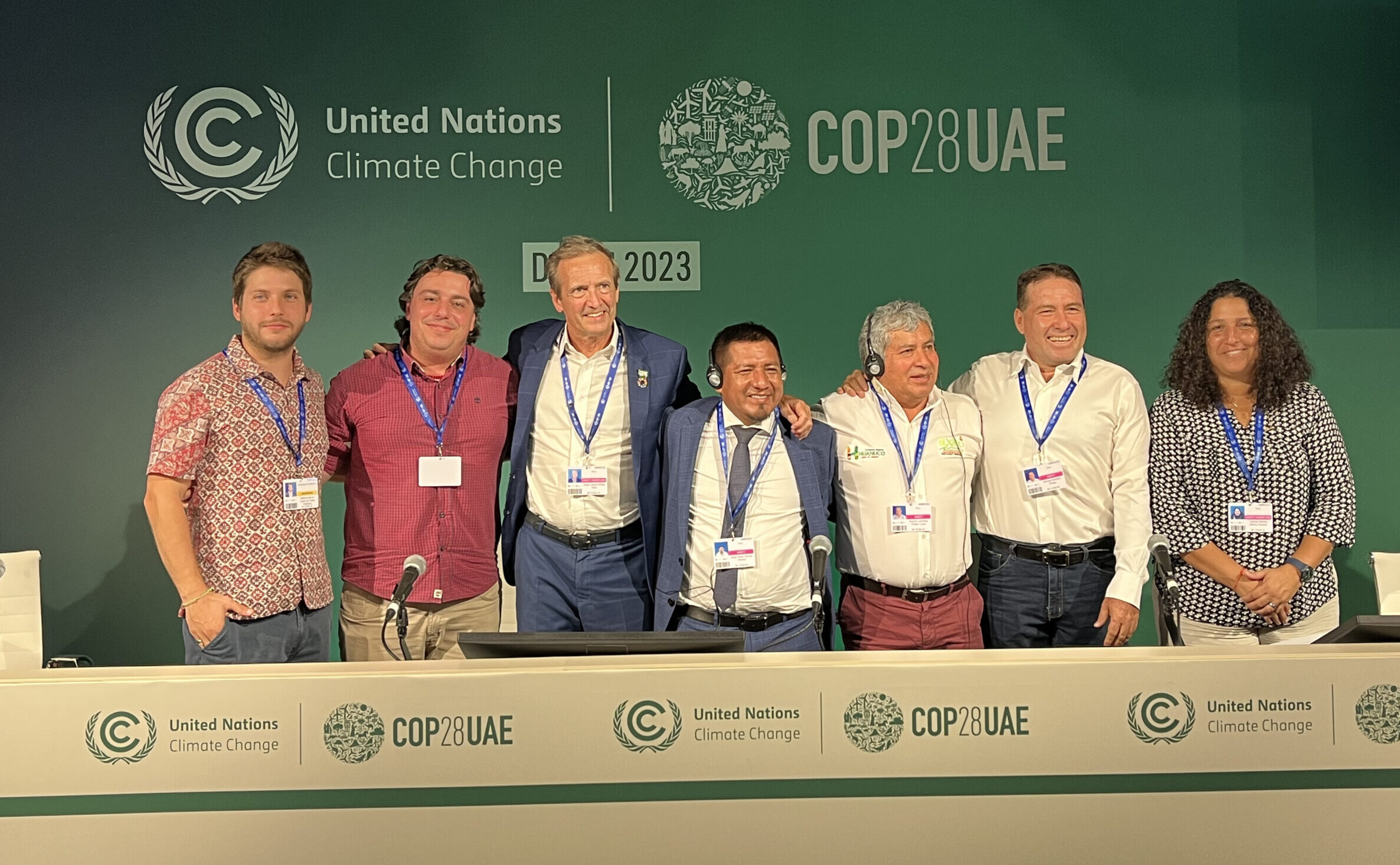
Other events hosted by the GCF Task Force also followed the same collaborative tone, as the “Critical Climate Partnerships” event with representatives from indigenous people from Brazil, the Kichwa nation, the Yurok Tribe, and elected government officials from Ecuador and the California Air Resources Board (see recording here). The technical panel on “Transparency and Data Needs for Jurisdictional Natural Climate Solutions”, also had the participation of civil servants from West Papua and Morona Santiago, indigenous people and civil society organizations as our partners CTrees and the Climate Action Reserve (recording available here).
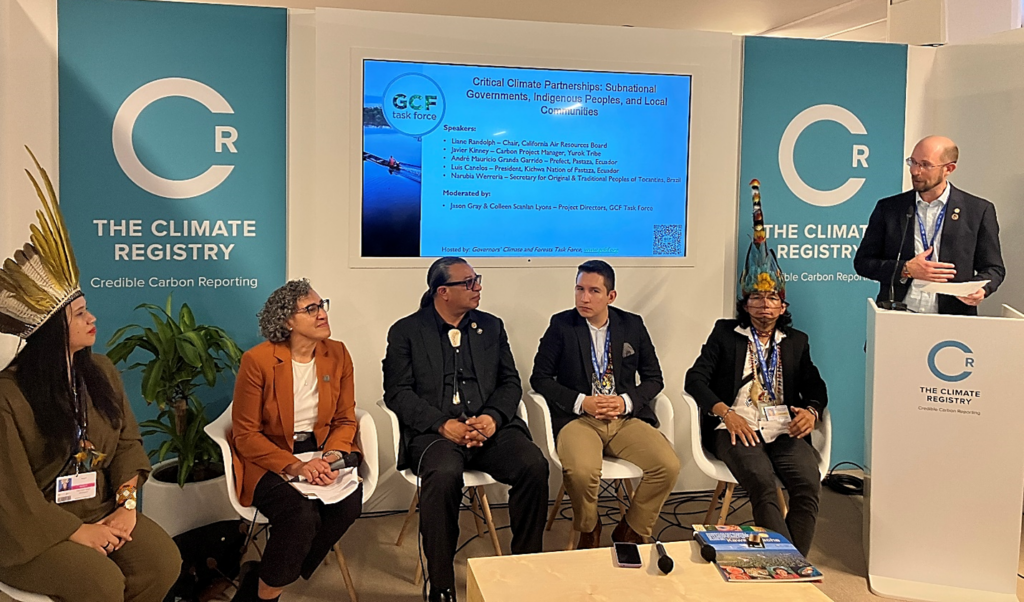
Collaboration is key for tackling our jurisdictions’ pressing needs
In the rich tapestry of events at COP28, the Governors’ Climate and Forests Task Force orchestrated the development important agendas related to climate finance and amplifying the voices of gender, Indigenous Peoples, and local communities. The commitment to securing an initial $1 billion for regional New Forest Economy Funds marked a groundbreaking step, underscoring the significance of sustainable forest economies. Simultaneously, the emphasis on gender-responsive climate finance strategies and the meaningful inclusion of Indigenous perspectives charted a path toward holistic climate action. Other notable events at COP28 further fortified collaborations, as subnational governments engaged in trilateral and bilateral discussions with civil society organizations and private entities, fostering a synergy that is integral to tackling climate challenges.
As we reflect on the advancements made during COP28, it is evident that the collaborative spirit driving these events must endure. While forging and strengthening partnerships remain a cornerstone of effective climate action, the road ahead is equally significant. The GCF Task Force looks forward to the next milestone— our annual technical meeting in Bolivia in April 2024. This upcoming gathering presents a vital opportunity for continued collaboration, knowledge exchange, and concerted efforts as we collectively navigate the intricate landscape of climate change mitigation and adaptation. The journey is ongoing, and the commitment to collaboration remains steadfast in the pursuit of a resilient and sustainable future.




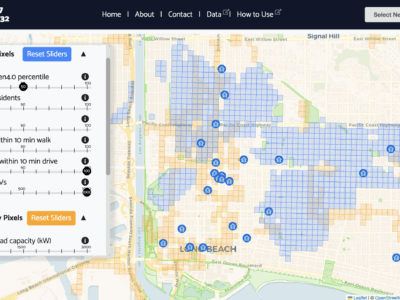

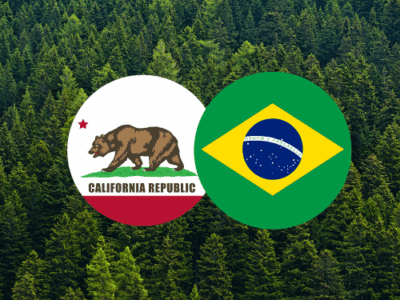
Reader Comments